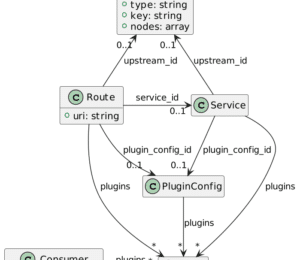Five ways to pass parameters to Apache APISIX
- April 30, 2024
- 4102 Unique Views
- 4 min read
I recently read 6 Ways To Pass Parameters to Spring REST API.
Though the title is a bit misleading, as it's unrelated to REST, it does an excellent job listing all ways to send parameters to a Spring application.
I want to do the same for Apache APISIX; it's beneficial when you write a custom plugin.
General setup
The general setup uses Docker Compose and static configuration.
I'll have one plugin per way to pass parameters.
services:
httpbin:
image: kennethreitz/httpbin #1
apisix:
image: apache/apisix:3.9.0-debian
volumes:
- ./apisix/conf/config.yml:/usr/local/apisix/conf/config.yaml:ro
- ./apisix/conf/apisix.yml:/usr/local/apisix/conf/apisix.yaml:ro #2
- ./apisix/plugins:/opt/apisix/plugins:ro #3
ports:
- "9080:9080"
- Local httpbin for more reliable results and less outbound network traffic
- Static configuration file
- Plugins folder, one file per plugin
deployment:
role: data_plane
role_data_plane:
config_provider: yaml #1
apisix:
extra_lua_path: /opt/?.lua #2
plugins:
- proxy-rewrite #3
- path-variables #4
# ...
- Set static configuration
- Use every Lua file under
/opt/apisix/pluginsas a plugin - Regular plugin
- Custom plugin, one per alternative
Path variables
Path variables are a straightforward way to pass data. Their main issue is that they are limited to simple values, e.g., /links/{n}/{offset}. The naive approach is to write the following Lua code:
local core = require("apisix.core")
function _M.access(_, ctx)
local captures, _ = ngx.re.match(ctx.var.uri, '/path/(.*)/(.*)') --1-2
for k, v in pairs(captures) do
core.log.warn('Order-Value pair: ', k, '=', v)
end
end
- APISIX stores the URI in
ctx.var.uri - Nginx offers a regular expression API
Let's try:
curl localhost:9080/path/15/3
The log displays:
Order-Value pair: 0=/path/15/3 Order-Value pair: 1=15 Order-Value pair: 2=3
I didn't manage errors, though. Alternatively, we can rely on Apache APISIX features: a specific router. The default router, radixtree_host_uri, uses both the host and the URI to match requests. radixtree_uri_with_parameter lets go of the host part but also matches parameters.
apisix:
extra_lua_path: /opt/?.lua
router:
http: radixtree_uri_with_parameter
We need to update the route:
routes:
- path-variables
- uri: /path/:n/:offset #1
upstream_id: 1
plugins:
path-variables: ~
- Store
nandoffsetin the context, underctx.curr_req_matched
We keep the plugin just to log the path variables:
function _M.access(_, ctx)
core.log.warn('n: ', ctx.curr_req_matched.n, ', offset: ', ctx.curr_req_matched.offset)
end
The result is as expected with the same request as above:
n: 15, offset: 3
Query parameters
Query parameters are another regular way to pass data. Like path variables, you can only pass simple values, e.g., /?foo=bar. The Lua code doesn't require regular expressions:
local core = require("apisix.core")
function _M.access(_, _)
local args, _ = ngx.req.get_uri_args()
for k, v in pairs(args) do
core.log.warn('Order-Value pair: ', k, '=', v)
end
end
Let's try:
curl localhost:9080/query\?foo=one\&bar=three
The log displays:
Key-Value pair: bar=three Key-Value pair: foo=one
Remember that query parameters have no order.
Our code contains an issue, though. The ngx.req.get_uri_args() accepts parameters. Remember that the client can pass a query parameter multiple times with different values, e.g., ?foo=one&foo=two? The first parameter is the maximum number of values returned for a single query parameter. To avoid ignoring value, we should set it to 0, i.e., unbounded.
Since every plugin designer must remember it, we can add the result to the context for other plugins down the chain. The updated code looks like this:
local core = require("apisix.core")
function _M.get_uri_args(ctx)
if not ctx then
ctx = ngx.ctx.api_ctx
end
if not ctx.req_uri_args then
local args, _ = ngx.req.get_uri_args(0)
ctx.req_uri_args = args
end
return ctx.req_uri_args
end
function _M.access(_, ctx)
for k, v in pairs(ctx.req_uri_args) do
core.log.warn('Key-Value pair: ', k, '=', v)
end
end
Request headers
Request headers are another way to pass parameters. While they generally only contain simple values, you can also use them to send structured values, e.g., JSON. Depending on your requirement, APISIX can list all request headers or a specific one. Here, I get all of them:
local core = require("apisix.core")
function _M.access(_, _)
local headers = core.request.headers()
for k, v in pairs(headers) do
core.log.warn('Key-Value pair: ', k, '=', v)
end
end
We test with a simple request:
curl -H 'foo: 1' -H 'bar: two' localhost:9080/headers
And we got more than we expected because curl added default headers:
Key-Value pair: user-agent=curl/8.4.0 Key-Value pair: bar=two Key-Value pair: foo=1 Key-Value pair: host=localhost:9080 Key-Value pair: accept=*/*
Request body
Setting a request body is the usual way to send structured data, e.g, JSON. Nginx offers a simple API to collect such data.
local core = require("apisix.core")
function _M.access(_, _)
local args = core.request.get_post_args() --1
local body = next(args, nil) --2
core.log.warn('Body: ', body)
end
- Access the body as a regular Lua table
- A table is necessary in case of multipart payloads, e.g., file uploads. Here, we assume there's a single arg, the content body.
It's time to test:
curl localhost:9080/body -X POST -d '{ "foo": 1, "bar": { "baz": "two" } }'
The result is as expected:
Body: { "foo": 1, "bar": { "baz": "two" } }
Cookies
Last but not least, we can send parameters via cookies. The difference with previous alternatives is that cookies persist on the client side, and the browser sends them with each request. On the Lua side, we need to know the cookie name instead of listing all query parameters or headers.
local core = require("apisix.core")
function _M.access(_, ctx)
local foo = ctx.var.cookie_foo --1
core.log.warn('Cookie value: ', foo)
end
- The cookie is named
fooand is case-insensitive
Let's test:
curl --cookie "foo=Bar" localhost:9080/cookies
The result is correct:
Cookie value: Bar
Summary
In this post, we listed five alternatives to pass parameters server-side and explained how to access them on Apache APISIX. Here's the API summary:
| Alternative | Source | API |
|---|---|---|
| Path variable | APISIX Router | Use the radixtree_uri_with_parameter router |
| Query parameter | Nginx | ngx.req.get_uri_args(0) |
| Request header | APISIX core lib | core.request.headers() |
| Request body | APISIX core lib | core.request.get_post_args() |
| Cookie | Method context parameter | ctx.var.cookie_ |
Thanks a lot to Zeping Bai for his review and explanations.
The complete source code for this post can be found on GitHub.
To go further:
Originally published at A Java Geek on April 28th, 2024
Don’t Forget to Share This Post!











Comments (1)
Java Weekly, Issue 541 | Baeldung
2 years ago[…] >> Five ways to pass parameters to Apache APISIX [foojay.io] […]